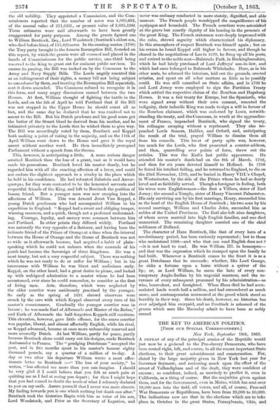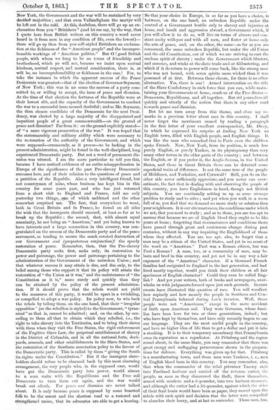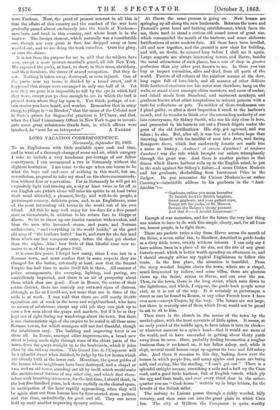New York, September 1 - 8th, 1863. A DEFEAT of any of
the principal armies of the Republic would just now be a godsend to the Pro-slavery Democrats, who have been routed right, left, and centre, in all the recent important State elections, to their great astonishment and consternation. For, elated by the large majority given in New York last year for Governor Seymour, and reckoning much upon the effect of the arrest of Vallandigham and of the draft, they were confident of success; so confident, indeed; as unwisely to predict it, even in California, as a thing of course. But the majorities given against them, and for the Government, even in Maine, which has sent over 18,000 men into the field, all voters, and all, of course, Free-soil War Democrats or Republicans, have been from 20,000 to 30,000. The indications now are that in the elections which are to take place in. October in the great States, Pennsylvania, Ohio, and New York, the Government and the war wilt be sustahied by very decided' majorities ; and that even Vallancligham the martyr will be left out in the cold. At this, doubtless, there will go up an ex- clamation from you " Britishers " (and let me say, by the way, that I quote here from British writers on this country a word' never heard in it from men in any condition of life, even the lowest)— there will go up then from you self-styled Britishers an exclama- tion at the fickleness of the "American people" and the incompre- hensible workings of "American politics." But 0 ! good British people, with whom we long to be on terms of friendship and brotherhood, which ye will not, because we insist upon mutual kindness, mutual respect, and mutual consideration, there is, or will be, no incomprehensibility or fickleness in the case,t For, to take the instance in which the apparent success of the Peace Democrats was greatest—that of the election of Governor Seymour, of New York ; this was in no sense the success of a party com- mitted to, or willing to accept, the issue of peace and disunion. At the time of that election the fortunes of the Republic were at their lowest ebb, and the capacity of the Government to conduct the war to a successful issue seemed doubtful ; and so Mr. Seymour, the then chosen candidate of the Democrats for the next Presi- dency, was elected by a large majority of the disappointed and impatient people of a great commonwealth—on the ground of peace and disunion? Far from it : on the ground explicitly stated— of "a more vigorous prosecution of the war." It was hoped that the statesmanship and military ability which were necessary to the restoration of the authority of the Government, and which were supposed—erroneously, as it proves—to be lacking in the present administration, might be found in the well-disciplined, long experienced' Democratic party. But not a word of permanent dis- union was uttered. I am the more particular to tell you this, because I have noticed evidences of an entire misapprehension in Europe of the significance of the past Pro-slavery Democratic successes here, and of their relation to the questions of peace and a partition of the Republic. Also a very intelligent friend, but not countryman of mine, whose business has kept him in this county for some years past, and who has just returned from a short visit to England and France, told me only yesterday two things, one of which saddened and the other somewhat surprised me. The first, that everywhere he went, both in Great Britain and in France, he found on all sides the wish that the insurgents should succeed, at least so far as to break up the Republic ; the second, that, with almost equal unanimity, he not being an "American," and yet being known to have interests and a large connection in this country, was con- gratulated on the success of the Democratic party and of the peace movement, as tending to secure the much coveted destruction of our Government and (preposterous conjunction)!' the speedy restoration of peace. Remember, then, that the Pro-slavery Democratic party seeks first, seeks only, its restoration to power and patronage, the power and patronage pertaining to the administration of the Government of the unbroken Union ; and that whatever success it may attain is due, and due only, to the belief among those who support it that its policy will attain the restoration of " the Union as it was," and the maintenance of "the Constitution as it is," more surely and quickly than they can be attained by the policy of the present administra- tion. If it should prove that the rebels would not yield to the measures of. this party, it would be upset in a twinkling, or compelled to adopt a war policy. Its policy now, to win back the rebels by telling them, on the one hand, that their "irregular opposition '• (so the rebellion is styled) to the Government, " tyran- nical " as that is, cannot be admitted ; and, on the other, by con- ceding to them all that to obtain which they rebelled, i.e., the right to take slavery into the Territories, and to bring their slaves with them when they visit the Free States, the rigid enforcement of the Fugitive Slave Law, the perpetual establishment of slavery in the District of Columbia, and in all the national forts, dock- yards, arsenals, and other establishments in the Slave States, and the restoration of the Southern annexation policy to the favour of the Democratic party. This is called by them "giving the South its rights under the Constitution." But if the insurgent slave- holders should refuse to be charmed back by this most charming arrangement, the very people who, in the supposed case, would have put the Democratic party into power, would almost to a man unite with the Republicans and the Free soil Democrats to turn them out again, and the war would break out afresh. For peace and disunion are never talked about. It is only because peace is supposed by some besotted folk to be the surest and the shortest road to a restored and strengthened union, that its advocates are able to get a hearing. :So that your choice in Europe, in so far as you have a choice, is between, on the one hand, an unbroken Republic under the control of a Government hostile only to slavery and injustice at home, and insult and aggression abroad, a Government which, if you will allow it to do so, will live on terms of sincere and con- stant amity with you and with all men, and foster at- home only the arts of peace, and, on the other, the same—as far as you are concerned, the same unbroken Republic, but under the old Union and the old Constitution, out of which we are striving to cast the unclean spirit of slavery ; under the Government which blusters, and annexes, and winks at the slave trade and at filibustering, and which if it do return to power will come back, like the strong man who was not bound, with seven spirits more wicked than it was possessed of at first. Between these choose, for there is no other alternative. Yes, there is one ! Armed intervention on the side of the Slave Confederacy in such force that you can, while main- taining your Governments at home, crush us of the Free States — Democrats, Republicans, and all together. But rid yourselves all quickly and utterly of the notion that there is any other road towards peace and disunion.
But let me turn away from this theme, and close my re- marks in a previous letter about race in this country. I shall never forget the merriment caused by reading a paragraph in the first letter of your excellent correspondent, Mr. Dicey, in which he expressed his surprise at finding New York an English town, filled with English people, and English things. It was like the man who remarked that in Paris even the children spoke French. Now, New York, from its position, is much less purely English, or purely Yankee, in its physiognomy than very many other towns in the older parts of the country ; and between the English, or if you prefer it, the Auglo-Saxons, in the United States, and those in Great Britain there can be detected some superficial traits of difference. Is not the same true of the people of Middlesex, and Yorkshire, and Cornwall? Still, you do on the other side never sufficiently appreciate, and you never can over- estimate, the fact that in dealing with and observing the people of this country, you have Englishmen in hand, though not British subjects. You are continually setting us up as some strange problem to study and to solve ; and yet when you walk in a room full of us, you find that we demand no more study or solution than your neighbours. It is our circumstances, the conditions under which we act, that you need to study ; and as to those, you are too apt to assume that because we are of English blood they ought to be like yours at home ; forgetting that circumstances and conditions there have passed through great and continuous change during past centuries, without in any way impairing the Engliskhood of those whom they affected. You are too apt, also, to forget that a man may be a citizen of the United States, and yet in no sensh of the word an "American." Paul was a Roman citizen, but was Paul a Roman? A man, too, or a community of men, may be born and bred in this country, and yet not be in any way a fair exponent of the "American" character. If a thousand French families had emigrated to England in the last generation, and had lived mostly together, would you think their children at all fair specimens of English character? Could they even be called Eng- lish? And yet your writers, both of books and newspapers, over- whelm us with judgments formed upon just such grounds. Recent events have illustrated this question of race. You will recollect how supinely and how meanly the people in Southern and Cen- tral Pennsylvania behaved during Lee's invasion. Well, those people were not "Americans," except in the mere accident of birth upon American soil. They were Germans, whose fami- lies have been here for two or three generations, indeed ; but who have kept by themselves, and have only recently begun to use our language. They are the most sordid people in the country, and have no higher idea of life than to get a dollar and put it into a stocking. It is to their temporary ascendancy that Pennsylvania owes its reputation 88 a repudiator. At Pittsburg and the region round about, in the same State, you may remember that there was great energy and unflagging perseverance shown in the prepara- tions for defence. Everything was given up for that. Pittsburg is a manufacturing town, and those men were Yankees, i. e., men of English blood born in this country. You may remember, also, that when the commander of the rebel privateer Tacony stole into Portland harbour and carried off the revenue cutter, the people, as soon as they discovered the theft, threw themselves, armed with muskets and a 6-pounder, into two harbour steamers, and although the cutter had a 32-pounder, against which the sides; of their frail boats would have been as paper, they moved upon the rebels with such spirit and decision that the latter were compelled to abandon their booty, and at last to surrender. Those men, too,
were Yankees. Now, the point of present interest in all this is that the affairs of this country and the conduct of the war have gradually passed almost exclusively into the hands of Yankees— men born and bred in this country, and whose heart is in the matter. The foreign clement, which naturally was a considerable one, though not very great at first, has dropped away or been weeded out, and we are doing the work ourselves. Ours the glory, or ours the shame.
It is not from the purpose for me to add that the soldiers have now, except a mere provost-marshal's guard, all left New York. We expected the parks, at least, to show, in their trees, shrubbery, and their furniture, the traces of armed occupation. But they do not. Nothing is taken away, destroyed, or even injured. One of the parks near my house is divided by a broad street, and it happened that troops were encamped in only one-half of it. Yet now they are gone it is impossible to tell by the eye in which half they were, except you go close enough to see in which the turf is pressed down where they lay upon it. You think, perhaps, of cer- tain stories you have heard, and wonder. Remember that in army slang, to pillage is "to Bleaker," that the name of the Colonel now in State's prison for disgraceful practices is D'Utassy, and that, when the Chief Commissary Officer in New York began to investi- gate some great subsistence frauds here, in which officers were involved, he "sent for an interpreter." A YANKEE
































 Previous page
Previous page